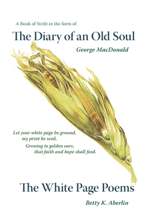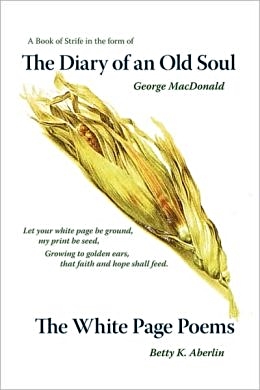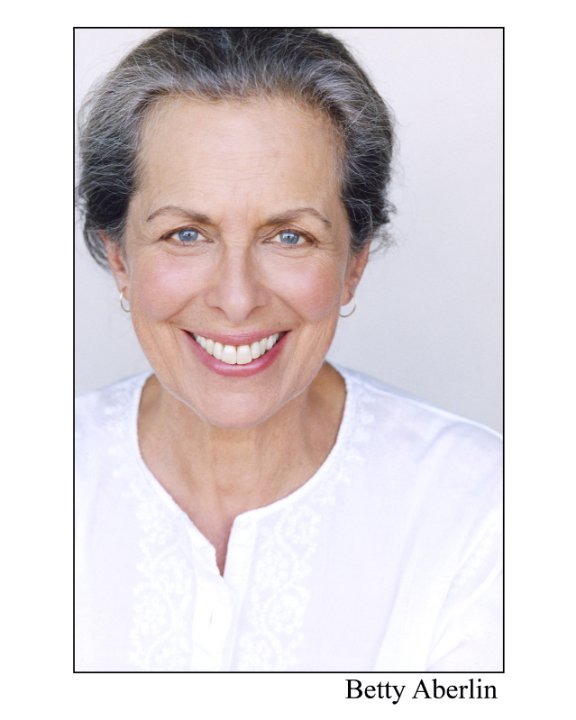

Diary of an Old Soul and The White Page Poems
George MacDonald and Betty Aberlin
In 1880, George MacDonald, the Scottish poet, novelist and preacher, in the wake of the deaths of two of his children, published A Book of Strife in the Form of the Diary of an Old Soul . This book, which unites grief and hope in hard-won faith, contains a poem for every day of the year. In the first edition of this classic collection there was a blank page opposite each page of poems. Readers were invited to write their own reflections on the "white page." MacDonald wrote: "Let your white page be ground, my print be seed, growing to golden ears, that faith and hope may feed."
Betty Aberlin, a native New Yorker of Russian-Jewish ancestry, raised in post-Holocaust orthodox atheism and nurtured in the arts, responded to MacDonald's invitation with daily poems of her own. Following the strict poetic form of The Diary of an Old Soul was an illuminating experience. In her own 7-line, 3-rhyme, 10-syllable pattern, Aberlin created a unique mixture of recurring themes and images drawing from Judaism, Christianity and her experiences as an actress and artist.
Her vision is fresh and honest, revealing a keen observation of nature and human nature, from the exhilarations of faith, hope and love to the despairs of war, rejection and failure. Aberlin opens a path into spiritual reflection for the thoughtful reader to follow.
Accolades for The White Page Poems:
"In this labor of love, Betty Aberlin's close readings of George MacDonald's verses, and her thoughtful responses to them speak clearly of her poetic gifts and spiritual intelligence."
Luci Shaw, poet and author.
“An awesome collection and collaboration." Daniel Berrigan, SJ, poet-in-residence, Fordham University.
"A fascinating new book . . . fresh and incisive."
Don King, author of C.S. Lewis, Poet.
George MacDonald and Betty Aberlin
In 1880, George MacDonald, the Scottish poet, novelist and preacher, in the wake of the deaths of two of his children, published A Book of Strife in the Form of the Diary of an Old Soul . This book, which unites grief and hope in hard-won faith, contains a poem for every day of the year. In the first edition of this classic collection there was a blank page opposite each page of poems. Readers were invited to write their own reflections on the "white page." MacDonald wrote: "Let your white page be ground, my print be seed, growing to golden ears, that faith and hope may feed."
Betty Aberlin, a native New Yorker of Russian-Jewish ancestry, raised in post-Holocaust orthodox atheism and nurtured in the arts, responded to MacDonald's invitation with daily poems of her own. Following the strict poetic form of The Diary of an Old Soul was an illuminating experience. In her own 7-line, 3-rhyme, 10-syllable pattern, Aberlin created a unique mixture of recurring themes and images drawing from Judaism, Christianity and her experiences as an actress and artist.
Her vision is fresh and honest, revealing a keen observation of nature and human nature, from the exhilarations of faith, hope and love to the despairs of war, rejection and failure. Aberlin opens a path into spiritual reflection for the thoughtful reader to follow.
Accolades for The White Page Poems:
"In this labor of love, Betty Aberlin's close readings of George MacDonald's verses, and her thoughtful responses to them speak clearly of her poetic gifts and spiritual intelligence."
Luci Shaw, poet and author.
“An awesome collection and collaboration." Daniel Berrigan, SJ, poet-in-residence, Fordham University.
"A fascinating new book . . . fresh and incisive."
Don King, author of C.S. Lewis, Poet.
55 minute interview with Betty on WSKG public radio


Praise from one of 27 positive endorsements on Amazon
"I stumbled upon George MacDonald’s Diary thirty-something years ago and keep going back again & again to these little daily treasures. His style, his images and his rhymes have haunted, invigorated and elevated me with their poignancy ever since.
Hearing of Betty’s thoughtful ‘expansion’ of MacDonald’s work found me a little suspicious of her ability to echo in any comparable way, his outpourings. Well, has she ever more than capably done so! She mirrors his sometimes tortuous syntax and clever rhyme schemes MORE than capably while suffusing his musings on each day with a music very much her own, and of our age."
"I stumbled upon George MacDonald’s Diary thirty-something years ago and keep going back again & again to these little daily treasures. His style, his images and his rhymes have haunted, invigorated and elevated me with their poignancy ever since.
Hearing of Betty’s thoughtful ‘expansion’ of MacDonald’s work found me a little suspicious of her ability to echo in any comparable way, his outpourings. Well, has she ever more than capably done so! She mirrors his sometimes tortuous syntax and clever rhyme schemes MORE than capably while suffusing his musings on each day with a music very much her own, and of our age."
